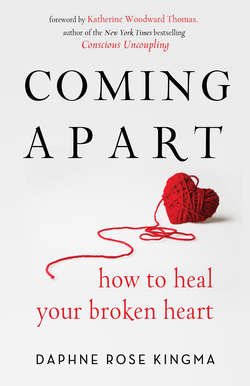Читать книгу Coming Apart - Daphne Rose Kingma - Страница 13
На сайте Литреса книга снята с продажи.
Existential Fears
ОглавлениеWhen I say that love is our security blanket, what I mean is that we use our intimate relationships more than any other experience in our lives to solve some of the most basic questions of our existence. “Why don't I live forever?” “What is the meaning of life?” “What should I do while I'm here?” We very often want to see our relationships as providing the answers to these questions. To the question “Why don't I live forever?” the answer becomes, “If you love me, it doesn't matter.” To the question, “What is the meaning of life?” we answer, “Love.” And to the question, “What shall I do while I'm here?” we often answer, “Love my husband, love my wife, enjoy one another till death do us part.”
Among the many things that we're continually trying to work out in our lives is the problem that none of us lives forever, that our human existence is finite. Because we are all afraid of death, of the ultimate extinction of our personalities, we do whatever we can to give ourselves stability. We try to provide ourselves with the illusion that some things can always be counted upon, that some things will always continue. We try to defend ourselves against the gaping hole of death by taking love into our lives, by staying close to the persons about whom and to whom we can say, “I know you'll always be with me. I know you won't leave me here alone.” Because the thought of death is so intimidating, whatever gives us the illusion of stability and permanence is extremely important to us, and it is to our relationships that we have assigned the primary task of providing us with this sense of permanence.
It is both natural and easy to expect this feeling of permanence from our relationships, because as children most of us experience ourselves as being constantly in relationship to our parents. From the very beginning of our conscious experience, we could feel that they were there, and, so far as we knew, they had always been there. They were there when we opened our eyes, when we first opened our mouths for nourishment, and when, gradually, we generated our first thoughts. Because of this continuous experience of them, our sense is that they are forever, that they always have been, and that they always will be. It is this sense of relationships as continuous and, in a sense, eternal that grants us the necessary stability in our early lives.
For most of us, there was also something immensely luxurious and peaceful about this early experience. Even though as adults we know that our childhood experience of safety was an illusion, we want to create a counterpart experience in adulthood by creating loving relationships, which we hope will serve the same stabilizing function. With our sweethearts, husbands, and wives as our constant protectors, we feel that we are safe. This is also true, in a different way, for people whose parents didn't create a feeling of security in childhood. For them there is a desperate need to establish the sense of security that was always painfully lacking.
One of the reasons we try so hard to duplicate our early experience through our adult love relationships is that in our society there are only two kinds of relationships we believe we can legitimately have. One is as a child in a family; the other is as a grown-up with a spouse. Despite the variety of options that are available to us—living alone, living in a singles’ community, living with roommates or friends—at the deepest level of our psyches, we still believe that these are poor substitutes for the real thing: a couple relationship that in its intensity of focus replicates the early childhood experience.
As children, our relationships were fixed; we were inextricably part of a family unit. But, in adulthood, we move into that segment of life where we choose our relationships. We hope to recreate in the format of an adult romantic relationship the feelings of security and connectedness that we experienced as children. When these adult relationships end, we are tossed out into the open sea of nonconnectedness; it suddenly feels as if we are totally alone. We can't go home and be little children again, so when we end our adult relationships, we feel as if we have separated ourselves from the only context and format we believe we're allowed to have as a safe harbor in our adult lives. We feel emotionally devastated.
